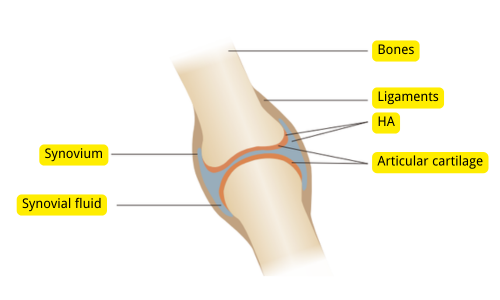Hyaluronic Acid for Dogs, the Emerging Market of HA
The global market size of hyaluronic acid for pets was estimated at $1.84 billion in 2024 and is projected to grow to $3.2 billion by 2032. This is a market with great opportunities.
Why Use Hyaluronic Acid for Pets
Pets are like family, and their health is a top priority for us. Hyaluronic acid plays a role in pet health through various aspects, for example, skin, coat, eyes, and joint care. Therefore, it has become an extremely competitive product within the pet market.
–Benefits of Hyaluronic Acid for Pets
HA is known for its moisturizing, lubricating, and wound-healing properties—benefits that also apply to pets. So, how hyaluronic acid helps your dog stay healthy?
- Hyaluronic Acid for Dogs’ skin: Relieves Dry Skin and Itching, Improving Coat Health
HA can hold 1,000 times its weight in water and form a hydrating film on the skin to prevent moisture loss. Skin and fur of animals are highly sensitive to environmental factors, i.e., dry weather in winter, pollen, and dust mites, that lead to itching. Hyaluronic acid not only moistures but also lowers inflammation and calming of the skin, easing redness and scratching from skin disease.
- Hyaluronic Acid for Dogs’ joints: Lubricates Joints, Easing Degenerative Joint Issues
Worried your pet will be less active as he ages or as he gains weight? Hyaluronic acid can help. HA is one of the principal components of joint synovial fluid and is used medicinally in joint injections. The fluid lubricates joints, keeps cartilage healthy, and allows for smooth movement.
- HA Accelerates Wound Healing in Pets
HA stimulates cell regeneration and decreases inflammation around wounds. In a feline skin wound study, those treated with HA gel healed 30% more rapidly than with standard treatments, with less scarring.
— Related Research
These findings have been backed by research.
In 2019, a police dog research institute conducted a study where dogs were fed a basic diet supplemented with hyaluronic acid twice daily. At 24 weeks, the results were that supplementing with 0.03% HA significantly reduced arthritis symptoms, and the 0.09% dose meant even more exaggerated improvements in hip arthritis. HA improved hydration of the skin and health of the skin, and it nourished hair follicles to create a smoother and brighter coat, stated the study.
Key Applications in the Pet Hyaluronic Acid Market
The HA market for pet animals is segmented geographically into eye health, skin health, and joint health. According to the International Veterinary Academy of Pain Management, over 35% of older dogs and 20% of adult cats have osteoarthritis. Given this, joint health holds the largest market share. At the same time, owing to its capacity to lubricate joint spaces and reduce inflammation, HA is extremely popular in this market.
Skin and coat health is another major application, with HA used in pet shampoos, conditioners, and skincare products to enhance hydration and elasticity. Eye health is also a growing segment, with sodium hyaluronate incorporated into eye drops and ointments to treat dry eye and other ocular conditions.
How Hyaluronic Acid Helps Your Dog Stay Healthy
- Oral Supplements
Oral HA can be taken up into the skin of a dog, synovial fluid, cartilage, and bone, according to research. Most pet food and supplement products are already formulated with HA, often combined with glucosamine and chondroitin in joint support products. Supply forms include chewable tablets, powders, and liquids—chewables for well pets with no swallowing issue, and powders/liquids for tiny pets or pets with an eating problem. In Europe, HA is added as a standard ingredient to racehorse, working dog, and show dog supplements, directed at joint maintenance and coat well-being.
- Topical Products
HA-containing gels, sprays, and creams may be applied to the skin in areas where the skin is dry or inflamed. HA eye drops are also marketed under professional veterinary supervision in dry or irritable eyes of animals.
- HA Injections
For worse cases of arthritis in dogs, oral supplements may not be enough. For these patients, HA injections deliver large doses directly into the joints, providing immediate relief from pain and swelling.
Stanford Chemical Company (SCC) is at the forefront of HA powder development. We offer injectable grade, food grade, cosmetic grade and medical grade sodium hyaluronate powder. For more information about these HAs, please check out our homepage.
People Also Ask
1. Is hyaluronic acid safe for pets?
Yes, hyaluronic acid is used safely in pets provided it is administered appropriately. It’s a natural component within the body, utilized to keep joints lubricated and skin hydrated.
2. What animals are appropriate for hyaluronic acid?
Dogs, cats, and horses, especially older animals or animals with joint disease, dry skin, or eye disease (e.g., dry eye), may be treated with hyaluronic acid.
3. Do side effects of hyaluronic acid occur in dogs?
Side effects are rare but may involve mild gastrointestinal upset if given by mouth or mild irritation at sites of injection.
4. Can I give my pet human hyaluronic acid products?
No, pet foods may contain additives, preservatives, or flavorings that are poisonous to animals.
5. How is hyaluronic acid helpful for dogs?
It makes the joints lubricated, moisturizes the skin, accelerates wound healing, and supports ocular health by hydrating the tear film. Some studies suggest it may even suppress inflammation.
6. What is the appropriate dosage of hyaluronic acid for my dog?
Dosage varies by the weight of the dog and the type of product. Normal oral supplements are 5–20 mg every 10 lbs of body weight per day, but follow the instructions on the package or your veterinarian’s advice. For injections or eye drops, rigid dosing by a veterinarian is necessary.
Reference
- What Are the Benefits of Hyaluronic Acid for Horse Health
- Substances and Supplements for Joint Health
- Hyaluronic Acid VS. Glucosamine VS. Chondroitin: Which Is Best for Joints?


